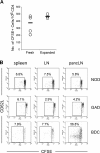In vitro-expanded antigen-specific regulatory T cells suppress autoimmune diabetes
- PMID: 15184499
- PMCID: PMC2211775
- DOI: 10.1084/jem.20040139
In vitro-expanded antigen-specific regulatory T cells suppress autoimmune diabetes
Abstract
The low number of CD4+ CD25+ regulatory T cells (Tregs), their anergic phenotype, and diverse antigen specificity present major challenges to harnessing this potent tolerogenic population to treat autoimmunity and transplant rejection. In this study, we describe a robust method to expand antigen-specific Tregs from autoimmune-prone nonobese diabetic mice. Purified CD4+ CD25+ Tregs were expanded up to 200-fold in less than 2 wk in vitro using a combination of anti-CD3, anti-CD28, and interleukin 2. The expanded Tregs express a classical cell surface phenotype and function both in vitro and in vivo to suppress effector T cell functions. Most significantly, small numbers of antigen-specific Tregs can reverse diabetes after disease onset, suggesting a novel approach to cellular immunotherapy for autoimmunity.
Figures







References
-
- Waterhouse, P., J.M. Penninger, E. Timms, A. Wakeham, A. Shahinian, K.P. Lee, C.B. Thompson, H. Griesser, and T.W. Mak. 1995. Lymphoproliferative disorders with early lethality in mice deficient in Ctla-4. Science. 270:985–988. - PubMed
-
- Tivol, E.A., F. Borriello, A.N. Schweitzer, W.P. Lynch, J.A. Bluestone, and A.H. Sharpe. 1995. Loss of CTLA-4 leads to massive lymphoproliferation and fatal multiorgan tissue destruction, revealing a critical negative regulatory role of CTLA-4. Immunity. 3:541–547. - PubMed
-
- Hori, S., T. Nomura, and S. Sakaguchi. 2003. Control of regulatory T cell development by the transcription factor Foxp3. Science. 299:1057–1061. - PubMed
Publication types
MeSH terms
Substances
Grants and funding
LinkOut - more resources
Full Text Sources
Other Literature Sources
Medical
Research Materials

